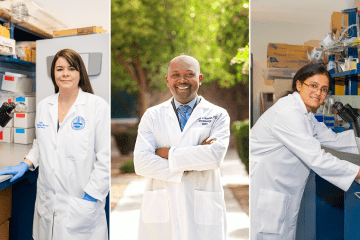Veterinary Students Present at Glendale’s Advanced Anatomy Dissection Event
On Friday, February 16, fourteen students from the College of Veterinary Medicine (CVM) presented posters for the Advanced Veterinary Anatomy Dissection event as part of the VMEDG 1321 course.

College of Veterinary Medicine (CVM) student presenters at the Advanced Veterinary Anatomy Dissection event.
Jose Rodriguez Sosa, M.V.Z., MSc, Ph.D., Associate Professor, Department of Anatomy, praised the students’ work, noting that “they designed and developed their own dissections based on their anatomical and surgical knowledge, creativity, and relevant literature. Therefore, the information shared during the event is unique every year. Innovation of established techniques is part of every project.”
Veterinary student Rachael Miller (CVM 2025), who presented at the event, was proud of the outcome of her presentation. “My project consisted of two orthopedic surgeries, a total hip replacement, and a double pelvic osteotomy on the contralateral side. My total hip replacement was performed using a ball from a phone stand tripod for the femoral head, and a moldable plastic for the replacement acetabular cup. The double pelvic osteotomy used a handmade plate that I made from metal brackets used for lumbar. I bent them to 90 degrees, cut the bend at a 30-degree angle, drilled screw holes, and then, after an endless amount of glue and epoxy kept failing, had them welded together at a local technical vocational school.”
“The making of the plate took a lot of planning! I began using cardboard to make a model and spent hours on the Internet trying to find specific measurements and angles for the real plates. Then, I made the first metal plate with the help of my father while I was at home on Christmas break. When I came back, I started my surgery without even thinking about what side and realized when I went to measure my plate that I cut the wrong side. So then, I had to make a whole other plate! Luckily, I realized my mistake while I was still relying on glue, so I only had to have the new one welded. I am not sure how many of the other surgeries required that much planning and metalwork.”
Rachael further reiterated how crucial the VMEDG 1321 course has been to her education as a future veterinarian. “This class is so important for aspiring veterinarians because it is the first time we have overlap between didactic learning and clinics. Veterinary medicine is ever-changing and evolving, so it is impossible to learn everything that might be seen in practice. This class has a foundation in critical analysis of research papers, which is something that all veterinarians will have to do at some point in their careers. It also combines critical thinking with surgical planning, surgical techniques, and innovation. These all are core skills that are used in day-to-day practice and are essential to becoming great veterinarians.”
Following the success of her presentation, Rachael has some advice to give future veterinarians. “To an aspiring veterinarian, I would say just to hold on tight. It honestly feels like last year I was working on my vet school applications, and now I am in clinics and have just over a year until graduation. There will be times when you want to quit and that you feel like a failure, but that happens to everybody.”
“My very first exam in vet school was an anatomy exam and when the results were released, it said that I got a 68%. I would be lying if I said I did not consider quitting right then and there. At that point, I had never failed at anything, and that sent me down the shame spiral. In my mind, if I couldn't even pass the very first exam, I was never going to make it all four years. Right about when I finally talked myself out of dropping out, they sent an announcement saying that the scores were incorrect, and my score went from failing to well above passing. That was honestly one of the largest emotional rollercoasters that I have ever been on, but it ultimately taught me to not put that much pressure on myself.
Since then, I still studied and put in the work. I just learned not to beat myself up over everything, and that grades do not define me and do not dictate how good of a doctor and surgeon that I will become.”



